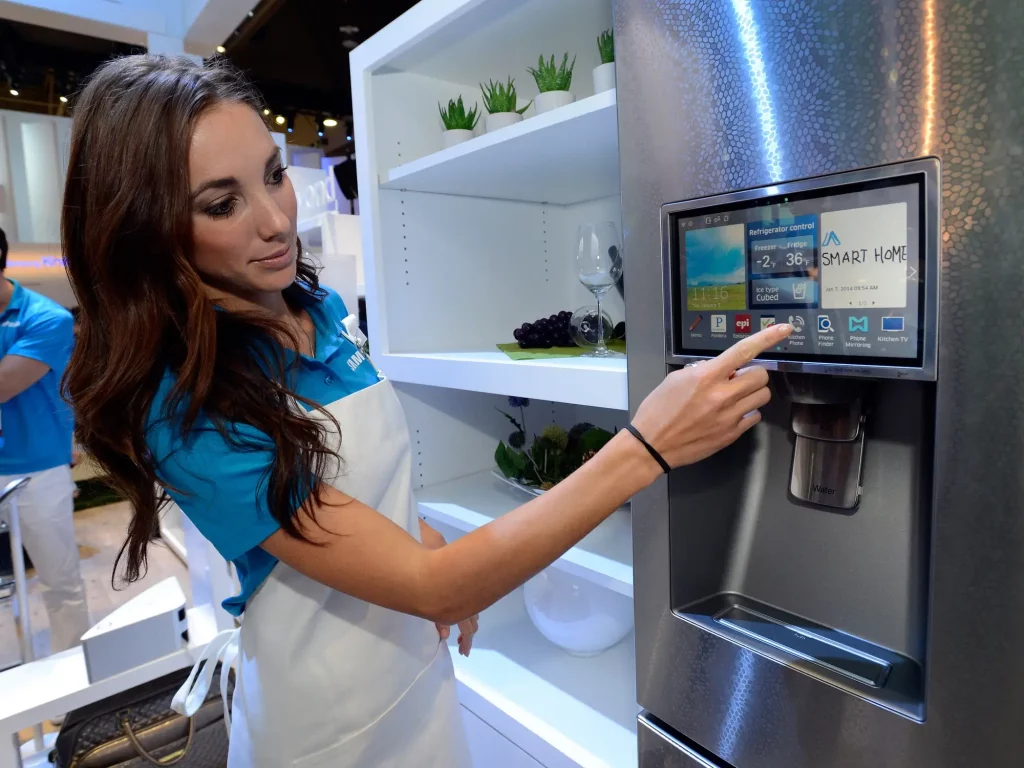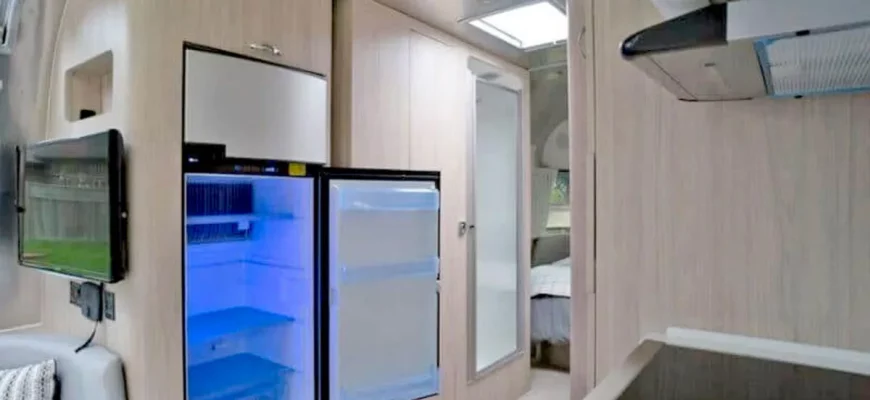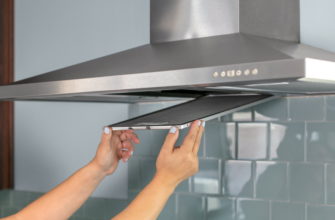Embarking on the quest to find the perfect refrigerator for your mobile home is akin to piecing together a multifaceted puzzle. Space is at a premium, and the usual one-size-fits-all approach just won’t do. When you’re navigating the cozy confines of a mobile home, every inch counts, and the selection of an appliance as central as a refrigerator becomes a balancing act between functionality and footprint.
Those who’ve walked this path know that the challenges are unique: it’s about merging the necessity of efficient food preservation with the spatial pragmatism of compact living. You require a unit that not only fits into the limited space but also complements the mobile home lifestyle—a lifestyle that often demands higher energy efficiency and adaptable design features.
This comprehensive guide is your ally, offering a tailored approach to help you circumvent the potential pitfalls of refrigerator shopping for confined spaces. We’ll navigate the intricacies of space constraints, dissect the pros and cons of various refrigerator styles, and delve into the importance of energy efficiency and sustainability. Additionally, we’ll explore the essential features that can enhance your experience, and offer insights on the critical aspects of budgeting, installation, and warranty coverage. By the end of this journey, you’ll be equipped with the knowledge to make an informed decision that marries convenience with compactness, ensuring your mobile home remains a haven of harmony and efficiency.

Understanding Your Mobile Home Space Constraints
When it comes to outfitting your mobile home with the right refrigerator, precision is your greatest ally. Think of your living space as a canvas where every square inch is precious, and the refrigerator—a sizable appliance—must be placed with the finesse of a master painter. It’s not just about finding a unit that fits snugly into a designated spot; it’s about allowing for airflow, door clearance, and ease of movement around it. In the mobile home environment, the dance between form and function is intricate, and one misstep in measurement can lead to a cramped and inefficient kitchen space.
Employing tools like AutoCAD, Revit, or SketchUp can elevate your planning from guesswork to precision. They enable you to visualize not just the refrigerator’s footprint but also its relationship with the rest of your home’s layout. It’s about envisioning the daily routine—will the fridge door obstruct pathways when open? Is there enough room above for heat dispersion? These are the nuances that turn a mere appliance purchase into a well-integrated lifestyle upgrade.
By taking the time to measure accurately, you’re ensuring that your investment is not only a perfect physical fit but also a testament to smart, value-conscious decision-making. As we transition into discussing space constraints in mobile homes, bear in mind that the right measurements are the foundation upon which kitchen harmony is built.
- Dimensional Limitations: The physical size of the available space often dictates the maximum height, width, and depth of the refrigerator that can be accommodated.
- Door Swing Radius: Adequate space for the refrigerator door to open fully without hitting walls or other appliances is critical for functionality and accessibility.
- Circulation Space: Ensuring there is enough room around the refrigerator for comfortable movement and airflow is essential to prevent overheating and maintain efficiency.
- Proximity to Power Sources: The location of electrical outlets may limit where the refrigerator can be placed without the use of extension cords, which is not recommended for safety reasons.
- Counter and Cabinetry Fit: The refrigerator should complement existing counters and cabinetry, both in style and in fit, to create a cohesive look and maximize space usage.
- Weight Considerations: The structural integrity of the flooring must support the weight of the refrigerator, an important consideration especially in older mobile homes.
As we peel back the layers of choosing the right refrigerator for your mobile home, it’s crucial to pause and reflect on the space constraints we’ve just explored. The dynamics of compact living are not just about economizing on space—it’s about orchestrating a harmonious dance between every element of your home. The refrigerator you choose becomes a pivotal partner in this dance, and recognizing the impact of space limitations is the first step toward a well-choreographed kitchen.
Imagine the frustration of a refrigerator door that can’t fully swing open because it’s obstructed by a wall, or the inconvenience of a unit that disrupts the natural flow of movement. Functionality, in the realm of mobile homes, is inextricably linked with spatial harmony. Therefore, when you’re evaluating options, envision each constraint not as a barrier, but as a guiding parameter shaping your decision—a framework within which innovation and efficiency thrive.
Let this reflection be the cornerstone of your selection process, inspiring you to delve deeper into the characteristics of refrigerator styles suitable for your mobile haven. It’s not just about fitting a refrigerator into a space; it’s about integrating an appliance that enhances your mobile home lifestyle. As we transition into exploring various styles, carry with you the wisdom that the right choice is one that respects your space, enriches your daily life, and aligns with the unique essence of mobile living.
Refrigerator Styles Suitable for Mobile Homes
As we delve into the realm of refrigerator styles suitable for mobile homes, it’s imperative to weigh the options with a discerning eye. The right style can have a profound impact on your living experience, blending form and function in a way that transcends mere aesthetics.
Consider the top-freezer refrigerator, a classic choice known for its economical use of space and budget-friendly price point. This familiar design, with the freezer compartment above the refrigerator section, provides straightforward accessibility. However, it may not be the best option for those with mobility issues, as the lower refrigerator shelves require bending to access.
On the other hand, bottom-freezer models offer the convenience of having the refrigerator compartment at eye level, easing the strain of constant bending. While typically more expensive, their ergonomic benefits are a worthwhile investment for many.
For those seeking a modern, streamlined kitchen, side-by-side refrigerators are an attractive option. These models facilitate easy organization with their vertical layout, but they often command a higher price and require more space for door clearance.
Lastly, the compact or mini-fridge emerges as a champion of space-saving. Ideal for the most constrained spaces, these units offer the essentials without the footprint of larger models. The trade-off, however, is a reduction in storage capacity.
Each style comes with its own set of considerations, which we’ll explore further. As you contemplate these options, imagine how they will integrate into your mobile home’s fabric, serving not just as an appliance, but as a piece that complements your lifestyle and space. With this knowledge, we’ll transition into understanding the specific sizing that aligns with your mobile home’s dimensions.

In the landscape of mobile home living, selecting a refrigerator that embodies both practicality and space efficiency is not just smart—it’s essential. The journey through various styles leads us to a pivotal question: which refrigerator will serve as the linchpin of your kitchen’s functionality without compromising on space?
The answer often lies within the sleek confines of the compact or mini-fridge. Championed for their petite stature, these units are a masterclass in space optimization. When square footage is a valuable commodity, the mini-fridge stands out as a beacon of practicality, ensuring essentials are chilled without overwhelming your kitchen.
Yet, for those yearning for a semblance of conventional design without the voluminous demands, the slimline top-freezer models emerge as a compelling compromise. These refrigerators maintain the classic feel but in a more slender profile, offering a balance of storage and spatial economy. They are a testament to the fact that thoughtful design can coexist with compact living.
It’s worth exploring the innovative solutions provided by ENERGY STAR certified appliances, which not only excel in space-saving designs but also operate with stellar energy efficiency. The combination of a reduced environmental footprint and lower operational costs makes them a savvy addition to any mobile home.
As we close this chapter on refrigerator styles, let the insights gathered here guide you towards a choice that echoes the ethos of mobile living—where every appliance is a deliberate selection that enhances your life, both spatially and functionally. With these considerations in mind, we will next navigate the precise art of selecting the right size for your mobile home’s unique layout and needs.
Selecting the Right Size for Your Mobile Home
Embarking on the mission to select the ideal refrigerator for your mobile home begins with an essential task: mastering the art of measurement. This step is not about mere numbers; it’s about understanding the three-dimensional space that will become your refrigerator’s new home. The key is to measure not only the width, height, and depth of the space but also to consider the necessary clearance for doors and drawers, ensuring seamless operation and accessibility.
Arm yourself with a reliable tape measure and a notepad, or even better, utilize digital tools like Magicplan or RoomSketcher that can help you create a virtual layout of your kitchen. Start by measuring the width, from one side of the space to the other, ensuring you account for any potential obstructions. Next, measure the height from the floor to the lowest point overhead, which may be a cabinet or ceiling. Lastly, measure the depth of the space, from the back wall to the edge of the counter or any protruding obstacle.
Remember, it’s not just the refrigerator’s external dimensions that matter but also the surrounding space. Allow for a few inches behind the fridge for proper ventilation and easy connectivity to power sources. These precise measurements are the blueprint for finding a refrigerator that not only fits but enhances the functionality of your mobile home kitchen.
| Refrigerator Type | Width (inches) | Height (inches) | Depth (inches) |
|---|---|---|---|
| Compact/Mini-fridge | 17 – 24 | 18 – 33 | 17 – 24 |
| Top Freezer | 23 – 33 | 61 – 66 | 24 – 32 |
| Bottom Freezer | 24 – 36 | 67 – 70 | 27 – 33 |
| Side-by-Side | 32 – 36 | 65 – 71 | 27 – 31 |
| French Door | 30 – 36 | 67 – 70 | 29 – 34 |
The distilled essence of our guide to refrigerator sizing is clear: precision in measurement is not just a recommendation—it’s a cornerstone of mobile home living. The table provided offers a compass by which to navigate the sea of options, but it’s the exact dimensions of your unique space that will chart the course to the perfect refrigerator. This pivotal step ensures that your daily life is enhanced by convenience, not hindered by a miscalculation.
Envision your kitchen as a ballet stage, where every appliance performs in harmony with your movements. A refrigerator that fits just right allows for a fluid kitchen experience, one where opening doors and drawers becomes a seamless part of the dance, not an interruption. The importance of allowing space for ventilation and access cannot be overstated—these considerations ensure your refrigerator runs efficiently and is easily serviceable.
As you move forward, let these insights on size and fit underscore every decision. With this knowledge, you will not only maximize your space but also preserve the joy and mobility that are intrinsic to the mobile home lifestyle. Your refrigerator should be a testament to smart living, a silent guardian of both your provisions and your space.
Energy Efficiency and Sustainability
The pursuit of an energy-efficient refrigerator transcends mere cost savings—it’s a commitment to sustainable living and a nod to the future of our planet. In the domain of mobile homes, where space is at a premium and resources are meticulously managed, the choice of an energy-efficient model is both a practical and environmentally conscious decision.
Opting for an ENERGY STAR certified refrigerator means embracing technology that can significantly lower your utility bills. These models are engineered to use less electricity without sacrificing performance, embodying the principle that less can indeed be more. They are the unsung heroes in the fight against energy waste, silently working to reduce your carbon footprint while keeping your food fresh and delicious.
But the benefits don’t end with energy conservation. An energy-efficient refrigerator also operates with reduced noise levels, contributing to the serene atmosphere of your mobile home. It’s an investment that pays dividends—not just in dollars and cents, but in the comfort and sustainability of your living space. As we delve deeper into the world of energy-efficient refrigeration, remember that your choice has the power to impact your daily life and the environment in profound ways.
Benefits of Energy-Efficient Refrigerators
- Lower energy bills due to reduced power consumption, making them cost-effective over time.
- Contribute to environmental sustainability by minimizing carbon footprint and energy waste.
- Quieter operation compared to standard models, providing a more peaceful home environment.
- Potentially higher resale value for your mobile home due to the inclusion of modern, efficient appliances.
Considerations for Energy-Efficient Refrigerators
- Higher initial purchase price, which may be a barrier for budget-conscious consumers.
- Limited style and model variety compared to standard refrigerators, which may affect design choices.
- Potential for more expensive repairs or replacements due to specialized components and technology.
The decision to invest in an energy-efficient refrigerator is more than a choice—it’s a strategic move towards long-term financial and environmental stewardship. By embracing these forward-thinking appliances, you’re not only reducing monthly utility costs but also participating in a global shift towards sustainability.
Energy-efficient models are designed to keep your food at optimal temperatures using less electricity, which translates into tangible savings over the appliance’s lifetime. These savings can be substantial, potentially offsetting the higher upfront cost. Moreover, with advancements in refrigeration technology, an ENERGY STAR certified refrigerator is an investment that aligns with the ethos of ‘green’ living, ensuring that each kilowatt-hour is used as efficiently as possible.
It’s this synergy of economy and ecology that positions energy-efficient refrigerators as a cornerstone in the sustainable mobile home. By choosing a model that echoes these values, you’re contributing to a larger narrative—one that prioritizes the well-being of our planet and the prosperity of future generations. In the next sections, we’ll navigate the intricacies of budgeting for your mobile home refrigerator, ensuring that your investment is both sound and aligned with your commitment to a sustainable lifestyle.
Budgeting for Your Mobile Home Refrigerator
When outfitting your mobile home with a new refrigerator, the compass that guides you through a sea of choices is your budget. Establishing a realistic financial framework is not just about numbers; it’s about ensuring that your investment aligns with your lifestyle and long-term goals. A well-planned budget acts as a beacon, illuminating the path to a refrigerator that meets your needs without plunging you into the depths of financial strain.
As you set your budget, consider both the initial purchase price and the ongoing operational costs. An energy-efficient refrigerator may carry a higher upfront cost, but the savings on utility bills can be substantial over time. Conversely, opting for a less expensive model might lead to higher energy expenses, which could eclipse any initial savings.
Your budget should also factor in the potential for longevity and durability. Investing in a quality refrigerator with a solid warranty can prevent costly repairs or early replacement. Remember, the true cost of an appliance is measured not just by its price tag but by its performance and endurance over the years.
As we look ahead to finding the balance between cost and quality, let us keep in mind that a thoughtful budget is the foundation upon which wise purchasing decisions are built. It’s about finding harmony between financial prudence and the joys of mobile home living.
A refrigerator is not just an appliance; it’s an investment in your home’s efficiency and comfort. Choose wisely, for the right refrigerator can be both a sanctuary for your food and a reflection of your commitment to quality living.
An industry expert highlighting the significance of investing in a quality refrigerator, especially in the unique context of mobile home living.
Finding the sweet spot between cost and quality in the pursuit of a mobile home refrigerator is akin to striking gold. It’s about unearthing value that doesn’t compromise on performance or longevity. To navigate this balance, become an informed shopper; research is your ally, and patience is your guide.
Start by exploring Consumer Reports or Good Housekeeping for unbiased reviews and ratings. These resources can shed light on the durability and efficiency of various models. Next, keep an eye on sales cycles—appliance discounts are often cyclical, with significant markdowns during holiday weekends or at the end of fiscal quarters.
Consider refurbished units from reputable dealers. They often come at a reduced price while still offering quality and reliability. Additionally, don’t overlook the opportunity to negotiate. Appliance sellers may be willing to match competitors’ prices or offer additional perks like free delivery.
As you wield these tips in your quest for the perfect refrigerator, let your budget be the map that leads you to a choice that resonates with both your wallet and your way of life. In the next sections, we’ll explore the additional features and functionalities that can elevate your mobile home refrigeration experience.
Additional Features and Functionalities
As we delve deeper into the world of mobile home refrigeration, it’s essential to consider the symphony of features that can elevate your experience. These are the bells and whistles that transform a refrigerator from a mere cold box into a powerhouse of convenience and innovation.
Imagine a fridge with flexible storage options, like adjustable shelves and bins that adapt to your ever-changing needs. Or consider the benefits of a water and ice dispenser, providing refreshing drinks on demand. And let’s not overlook energy-saving LED lighting that bathes your food in a clear, natural glow while conserving power.
These features aren’t just luxuries; they represent a tailored fit for your mobile home lifestyle, where every square inch and watt counts. As we move forward, keep in mind that the right features can turn the simple act of refrigeration into a seamless part of your daily rhythm.
- Adjustable shelving to maximize space and accommodate various food items sizes.
- Energy-efficient models with ENERGY STAR certification to reduce electricity costs.
- Compact design with a smaller footprint to fit neatly into limited mobile home spaces.
- Built-in water and ice dispensers for convenience and space-saving.
- Reversible doors to adapt to different kitchen layouts and improve accessibility.
- Frost-free technology to eliminate the need for manual defrosting and maintain consistent temperatures.
- LED interior lighting for a brighter, energy-saving view of contents.
- Smart refrigerators with Wi-Fi connectivity for remote temperature control and monitoring.
As we wrap up our exploration of modern refrigerator features, the key takeaway is selectivity. Each innovation, from adjustable shelving to smart technology integration, should be weighed against your personal lifestyle and the unique demands of mobile home living.
Consider which features will bring you daily convenience and efficiency, and which may be superfluous. For the culinary enthusiast, ample flexible storage might be paramount, whereas the tech-savvy homeowner may prioritize Wi-Fi connectivity for remote management. It’s about curating a list that reflects your priorities, ensuring every added feature serves a purposeful role in your home.
In this tailored approach, you transform a collection of features into a harmonious appliance that sings in tune with your daily rhythm, making the refrigerator not just a tool, but a trusted companion in your mobile home journey.
Installation and Warranty Coverage
The installation of your mobile home refrigerator is not merely the final step—it’s a critical juncture that ensures optimal performance and longevity. Opting for professional installation safeguards against common pitfalls that can arise from DIY attempts. It’s a layer of assurance, affirming that your appliance is set up for success from the start.
Equally pivotal is a thorough understanding of your refrigerator’s warranty coverage. This is your safety net, protecting you against unforeseen defects or issues. Take the time to read the fine print and grasp the extent and duration of the protection offered. A robust warranty signifies a manufacturer’s confidence in their product and provides you with peace of mind.
As you proceed, remember that the decisions you make regarding installation and warranty can be as consequential as the selection of the refrigerator itself. They are the bookends to your purchasing journey, framing a narrative of careful planning and meticulous execution.

As we conclude this crucial chapter on installation and warranty, let’s crystallize the essentials for a stress-free experience. Seek out warranties that cover comprehensive parts and labor, and those that include a no-lemons guarantee, ensuring replacements for repetitive issues. A longer warranty period often reflects a manufacturer’s trust in their product—a sign you should look for.
For installation, streamline the process by verifying access points and measurements before the technician’s arrival. Ensure there’s a clear path to the installation site and that electrical connections comply with your new refrigerator’s specifications. For a list of certified professionals, visit the Service Society website.
By focusing on these key terms and preparation tips, you can navigate the final stage of your refrigerator’s journey with ease, setting the stage for years of reliable service and culinary delight in your mobile home.









